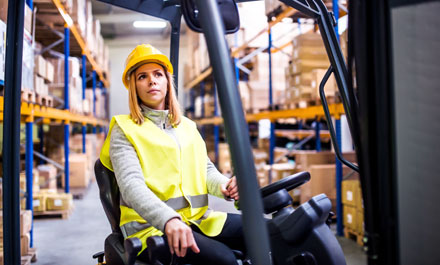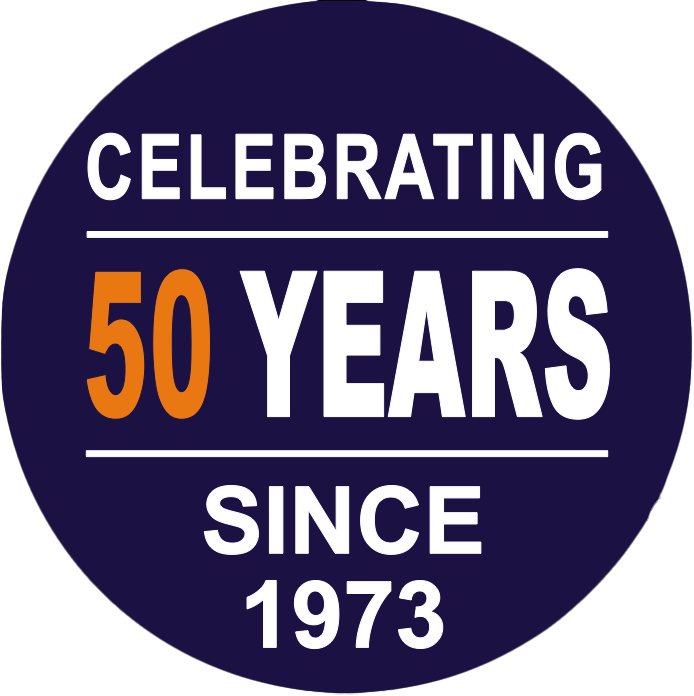Forklift training – What does it involve, and how can it benefit your workplace?
Companies that operate forklift trucks have a legal responsibility to ensure that all operators are properly trained and certified. For some, this red tape can put them off implementing forklift trucks altogether or risk employing operators without the necessary certification. But achieving certification really isn’t as difficult or as expensive as it sounds.
In this blog, we’ll look at what is involved in the training and certification process and what benefits having properly certified forklift truck operators will bring.
Why forklift truck training is important
According to data from the British Safety Council, forklift trucks represent the most dangerous form of workplace transport in the UK. Each year 1,300 people are seriously injured following forklift accidents. That amounts to more than 5 people each day suffering debilitating life-changing injuries.
The Health and Safety Executive (HSE), which investigates all serious accidents in the workplace, has found that the majority of these accidents are avoidable. While some accidents are attributed to poor maintenance, the vast majority are due to a lack of training.
Helps improve safety in the workplace
With forklifts posing numerous dangers to both drivers and pedestrians, it is important that all operators are trained and certified to use the equipment properly.
A certified forklift operator is trained to assess the risks before each type of manoeuvre, which can help to prevent accidents and injury to both operators and pedestrians.
This not only helps to improve safety in the workplace: it also reduces the risk of damage to delivery vehicles and buildings and protects you from litigation in the unlikely event that an accident does occur. It will also allow you to obtain public and employer liability insurance for your operations. Operating a forklift without having certified staff will most likely void your policy.
Forklift training requirements
Forklift truck training courses are designed for people with little or no experience operating a forklift. The course covers both theory and practical lessons to ensure operators have enough knowledge and experience to pass both the theory and practical test.
Before training begins, operators will need to ensure the following basic requirements are met:
– Must be at least 20 years old
– Had an eye test within the previous two years (proof is required).
What does forklift training involve?
To obtain forklift truck certification, operators will have to pass a written theory exam followed by a practical test for the specific type of truck they wish to operate. This ensures they can properly assess the risks of operating such machinery and can manoeuvre the vehicle safely in all environments.
Both of these tests can be completed the same day at any test centre across the UK. Alternatively, employees can be trained and assessed on site. At Radnes, we carry out our training at your premises, this allows our team to asses what equipment is being used and tailor our training accordingly.
While there is no legal requirement to obtain training before the test, it is extremely unlikely that new operators will pass without having some form of practical experience. That’s why we recommend our basic training course for all new operators and conversion courses for operators with existing experience on other types of trucks.
What types of forklift certification are available?
Operators will need specific training and certification for each type of forklift truck they wish to operate. In the UK, certification is issued by one of three licensing bodies; CPCS, ITSSAR and NPORS. Certificates are not transferable, but conversion training can be arranged for operators with experience operating other types of forklift.
Refresher courses are also available for employees who are already certified but may need extra training to meet new legislation. The HSE recommends that all certified employees take a refresher course every three years to maintain proficiency.
Most forklift trucks fall into one of the following 6 categories:
Counterbalance forklift – CPCS category A16
This is the most popular type of truck which is used in warehouses and storage yards across the UK. They consist of two fork arms at the front which is counterbalanced by a weight at the back. Loads can be raised or lowered by the forks which offer a reach of around 20 ft. The forks can also be tilted forwards or backwards by up to 15º. This type of truck can also be fitted with a range of attachments to increase flexibility.
Reach truck – CPCS category A18
Reach trucks are designed for use in warehouses with restricted space. They are called reach trucks because the mast moves independently of the chassis allowing it to reach into warehouse racking to collect pallets. They are extremely manoeuvrable and have a reach of up to 40 ft.
Rough terrain – ITSSAR category J1/J2/J3
This type of forklift is similar to a counterbalanced truck but is equipped with oversized pneumatic tyres which provide greater ground clearance, allowing the truck to be used on rough terrain. They are popular in the construction and mining industries and can be fitted with a range of attachments to suit different applications.
Telescopic forklift – CPCS category A17
This is a unique type of forklift where the forks are connected to a boom which can be extended to provide extra reach. They are available with a range of chassis configurations including two and four-wheel drive and can be fitted with two-wheel, four-wheel or crab steering. Training will have to be tailored to suit the specific type of truck you wish to deploy.
Side-loader forklift – ITSSAR category C2
With side-loader forklifts, the load is carried on the side of the truck instead of the front. This allows greater stability when moving or stacking long loads such as timber and pipes. They are available in a range of sizes and can be fitted with stabilisers to help provide stability for oversized loads.
Pedestrian-operated lift truck – ITSSAR category A1
With a pedestrian-operated truck, the operator walks beside the machine controlling it with a power handle. They are typically electrically powered and will need charging when not in use. These trucks have limited lifting capacity and reach which limits their use to moving goods around the warehouse floor.
What challenges will new operators face
Operators who have never driven a forklift before will be faced with a number of unique challenges. A good training provider will work with trainees to provide practical training to overcome these challenges.
Our experience shows that new operators will need time and practical experience to master the following concepts:
1. Load balancing
Unbalanced forklifts are one of the leading causes of forklift accidents, especially with new operators. At Radnes, we focus on helping operators understand weight distribution concepts and give them plenty of practical experience handling heavy loads. This gives them the confidence to operate a forklift safely under all loads.
2. Restricted vision
Due to their design forklifts have restricted vision out front. When a load is being carried it is often difficult to spot obstacles and pedestrians. It is therefore important that the operator is trained to spot potential obstacles before attempting to use the machine. At Radnes, we train operators to asses their field of vision before each task.
3. Uneven terrain
Sometimes it is necessary for a forklift to work outside in the yard. The surfaces in these areas are often uneven and sloped which can cause the forklift to become unstable. We train operators to compensate for these surfaces allowing them to work safely in all areas and terrains regardless of how much load they are carrying.
4. Fork control
Operators should have smooth control of the forks at all times to ensure the truck remains stable. This is one of the most difficult aspects to master and it can take a little practice for a beginner to become proficient. That’s why we allow plenty of time for practice and have developed lots of exercises to help new operators build the deftness required to operate forks smoothly.
5. Pedestrian avoidance
Forklift trucks can move quickly but have long stopping distances, particularly when carrying a heavy load. It is therefore important that the operator is trained to assess pedestrian traffic which is in and around the operation area before manoeuvring the vehicle. Failure to do so can cause injury and even death, so this is one of the most important aspects of training.
How long does forklift truck training take?
The amount of time it takes a complete beginner to gain enough practical experience to pass the assessment will depend on the type and complexity of the truck involved. But as a general rule of thumb, most training can be completed within five working days. This allows enough time for the operator to become proficient with all the different manoeuvres and gives them the knowledge they need to pass the theory exam.
Advantages for employers and employees
Ensuring staff are properly trained to operate lift machinery has many advantages for both the company and its employees. Here are a few benefits your company and its employees can expect from having staff properly trained to operate forklifts.
Employers
Lower insurance – Having certified forklift truck operators can help to reduce your public and employers liability insurance premiums.
Improved morale – Investing in your staff will increase staff morale helping you to build a more cohesive and efficient working environment.
Increased safety – Properly trained staff create a safer working environment and reduces the risk of accidents.
Greater efficiency – Staff trained to use machinery properly will ensure it is operated within its performance parameters. This lowers maintenance costs and increases efficiency.
Employees
Increased wages – Staff certified to use machinery can expect higher pay than non-trained staff.
More responsibility – More responsibility not only means more pay, but it can also help build confidence.
Greater employability – Certified staff are more employable which means more job prospects and better opportunities.
If you would like more information about the types of forklift training we provide, complete our contact form or give us a call on 0800 195 9831. Our team of expert trainers are always available to answer questions about the training services we provide. We can also arrange a site visit to check your equipment and premises are suitable for training.



